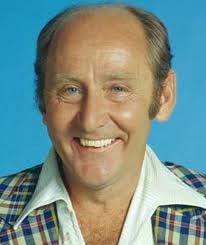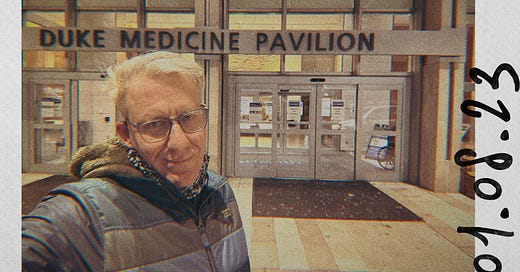With this post, I continue to play around with Substack’s functionality to see if I can stumble across anything I can use incorrectly to make learning/”producing content” about cancer and its many life lessons more interesting for you and I. I’m not expecting anything to leap out at me, but you never know what the future holds now or 17 posts in the future. And as many of you may be aware, I almost always put these posts together in several sittings due to fatigue and focus issues so as I write this section, I have no idea how this particular experiment turned-out so buckle up and enjoy the ride!
I originally wanted to write a post about my experiences switching from cancer treatment in Knoxville, Tennessee to Richmond, Virginia because, despite both locations having multiple medical centers that offer what is called “standard of care (SOC)”, the quality of care and range of services varies radically. “SOC” should really stand for “simplest of care”. Don’t get me wrong, SOC isn’t terrible, but it’s also a very misleading term.
I think most would assume that SOC is a high one, and it is pretty advanced. The problem is that brain cancer, like many “issues” is not a one-size-fits-all type thing. For instance, extended genomic testing revealed that I’m in a small but not insignificant category whose tumor actually responds poorly to the SOC-recommended first line medication nearly every brain cancer patients gets prescribed, temolozide.
There are other ways SOC varies from facility to facility. Not all diagnostic equipment is of the same quality. Heck, I’ve had a doctor order MRI scans from a very specific machine within a hospital and with a specific MRI tech. And as I’m pretty sure I wrote about before, not all doctors are amazing. Things like workload, specialized training, empathy, and raw talent all impact one’s care. I personally believe that 10% of folks in any profession have no business in that line of work… whether police, attorneys, hair stylists/barbers… and even doctors.
10% just suck at what they do. Of course, I also believe 10% are exemplary. The other 80%? Competent.
Some ways my new local team in Virginia differs with my previous teams in Knoxville :
my local doc is actually a brain tumor specialist (neuro-oncologist vs. a general oncologist)
my new hospital has things like neuro-opthamolgists, neuro-psychologists and other medical specialists geared specifically to følken with brain tumors (because cancer ain’t just life and death)
my new team actually communicates about tests, medications, and stuff more completely with my team at Duke in North Carolina that oversees my care instead of bare bones information
far more advanced mental health and community support geared towards folks with brain tumors
the new team only treats people with brain tumors as opposed to brain cancer AND all the hundreds of other cancers that unfortunately exist.
I believe it’s possible to get good care everywhere and that my old care teams were mostly just doing the best they could with the resources being provided to them by their corporate overlords, but that doesn’t change the fact that some facilities are just statistically better suited to providing care for specific conditions. If the word “statistically” seems like an odd word to use, remember that I believe it’s possible to get good care anywhere, but that does come with an asterisk (*=prepare to do some careful consideration). And conversely, it’s possible to get bad care at a generally highly-rated facility. So I guess I should’ve written “it’s possible to get good or bad care anywhere”. Heck, I even kinda believe it’s possible to get both good and bad care anywhere as everyone has their strong and weak points.
Basically: Don’t assume anything.
Note: if you are being told “sign in” to Youtube to prove you’re not a bot… that’s part of the reason I’m experimenting with Subastack’s video functionality.
So now that we’ve hopefully taken a brief video break, understand that we didn't really take a break at all but actually set-up the next section I’d like to write about: how life is really a tv sitcom.
It may seem obvious from the “assume” clip that I’m thinking specifically about the original version of “The Odd Couple” but the point I’m really getting could be applied to many other great shows. 10%? 80%? Maybe all?
Consider that “The Odd Couple” that most of us have come to know and love was not an original idea. It was actually based on a stage play and had already been made into a film. In fact, the original title for the original tv show was actually “Neil Simon’s The Odd Couple” which seems an odd name for a tv show. The Neil Simon part was dropped after the first season. And the show has also been rebooted twice as a tv show and inspired an offshoot idea cartoon (“The Oddball Couple”).
This is to say that in both cancer and life, things are complicated. There’s a lot to consider before coming to any conclusions… and not just the stuff someone may first assume.
It now seems that both Jack Klugman and Tony Randall would seem to be the obvious casting choices, but neither was an original selection for their roles. Or the second. Dean Martin and Mickey Rooney were the original choices. But both Klugman and Randall were the ones who both became iconic.
You just never know how things are gonna turn out.
I know for me and many others, I wondered if Felix’s sexual orientation had anything to do with his divorce. While that was never really explored in the series beyond a series of bad dates, the vagueness added an unspoken statement that, ultimately, whether the character was gay or not just didn’t matter as to how funny the show was or how the two men cared for each other in their idiosyncratic way.
And consider that Randall, who was not gay but comfortable playing “effeminate” roles, had the unexpected origin as a Jew from Oklahoma. His biggest role prior to the series had been as a co-lead in the film “Will Success Spoil Rock Hunter?” alongside Jayne Mansfield.
Yeah, I don’t know it either. Randall was considered to be a talent by those in the know but he was far from an obvious choice.
And yet, the guy who wasn’t supposed to be cast in a show that was a rehash of two other productions and get this… was almost cancelled every season of its existence due to poor ratings… became a television icon. The show itself received Emmy nominations and became the template (two lovable misfits who somehow figure out how to get along) for a vast number of tv shows that followed. They couldn’t even decide if the show should use a laugh track or a live audience, how many cameras with which to shoot the show, or if it was ok to cast the same actor in nine very different roles across nine very different episodes.

The point is that no one ever knows where greatness will be found. There are generally signs but they don’t only come from ranking lists.
So, whether it’s choosing the right hospital for brain cancer treatment or where to eat dinner tonight, focus on the fundamental signs of importance. The bottom line is that it is up to each of us to do a bit of thinking and make some decisions accordingly. Just try to be as smart and objective as possible and don’t rely too much on gut suspicions that can often be tainted by misinformation and cultural trends.
You know, like how many in the US chose their 47th President. Sorry… I can’t help myself.
To watch the video (and others I’ve made), click this link.
Resource links from the end of the video:
National Brain Tumor Society (NBTS)














Share this post